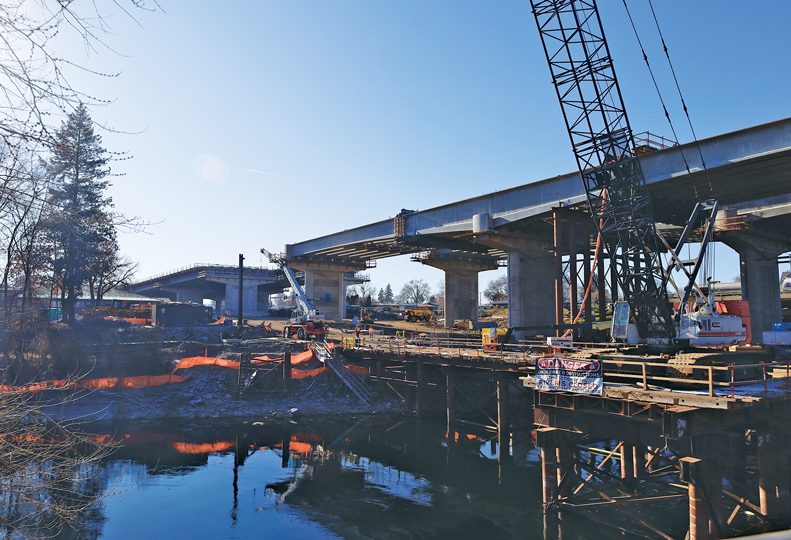
Home » A Chilling Effect: Contractors adjust to state bidding freeze
A Chilling Effect: Contractors adjust to state bidding freeze
Uncertainty looms as fate of new projects awaits Legislative action

Construction of the North Spokane Corridor's Spokane River Crossing segment won't stop due to the bidding freeze, however upcoming segments scheduled to start this year will be delayed.
| Karina EliasJanuary 30, 2025
Clarification: Work is moving forward for some Washington State Department of Transportation projects for safety, preservation, and fish passage. Additional transportation projects will go out to bid this year. More details are available deeper in the article.
A bidding freeze on new projects called for by the Washington State Department of Transportation is creating uncertainty for construction companies and potentially could result in the loss of hundreds of jobs and millions of dollars in revenue, some contractors here say.
The bidding freeze has been in effect since the fall and is expected to last through the end of the legislative session this spring. The pause is causing delays in essential transportation projects, including the timeline to complete the North Spokane Corridor, WSDOT officials say.
Charlene Kay, regional administrator for WSDOT, says the bidding freeze is the result of revised revenue projections for the state that are $10 billion to $12 billion lower over the next four years than previously had been forecast. Along with reduced gas tax revenues in the state, that could translate to a shortfall of about $1 billion to $2 billion in WSDOT's budget over the same time frame.
Several segments of the ongoing North Spokane Corridor project will be delayed due to the pause on contractor bidding.
The section of freeway connecting the Spokane River to Sprague Avenue is now slated to be advertised as an upcoming bid opportunity in February, a month behind the initial schedule, says Kay.
Larry Larson, assistant regional administrator for development at WSDOT, says another section of the corridor has been delayed up to two months for the Sprague Avenue to Spokane River-Stage 2, which will provide a freeway connection between Mission and Alki avenues.
"That was scheduled to go to advertisement in April, that would be more likely a May or June advertisement," Larson says.
Max Kuney, owner, president, and CEO of Spokane-based Max J. Kuney Co., says delayed bid advertisements convert into longer construction timelines to complete projects.
"If it doesn't bid until May, then it gets awarded in June, and now summer is half over, and we've almost lost an entire season," Kuney says.
Ongoing projects already under construction won't be impacted by the freeze, such as current construction of the Spokane River Crossing segment of the NSC project, located north of the Spokane Community College campus.
The river crossing section is scheduled to be completed by year-end.
Kuney's heavy civil contracting company has worked on much of the corridor project and provides bridge and dam work across the state, he says.
Max J. Kuney Co. has worked with WSDOT since the company was established by his grandfather 95 years ago, and he's never experienced a call to stop new bidding from the agency before, he says.
WSDOT is Kuney's No. 1 client and while the company continues working on some ongoing multiyear projects, the freeze is causing work-schedule gaps affecting the company's 150 employees.
"It's got us scouring smaller projects just trying to fill in the gap," Kuney says. "We're bidding projects we probably wouldn't normally look at."
Contractors likely will find increased competition in the market for smaller transportation projects put out by cities and counties that have projects that aren't tied to state funding, says Kuney.
The bidding freeze also is impacting subcontracting companies.
"It's going to be hard on the subcontracting community because if they specialize in work that WSDOT does, they're going to have to ... find somebody else to work for, and that's not always easy," says Kuney.
Stephanie Simpkins, owner of North Star Enterprises 1 Inc., says the Liberty Lake-based traffic control company could face the potential loss of significant revenue if WSDOT doesn't start accepting bids again for new work soon.
North Star Enterprises is a union contractor with 100 to 150 employees and provides traffic control and other road work, including street sweeping, road grinding, striping, crack sealing, and guidepost installation, Simpkins says.
"We're going to start looking more aggressively in Idaho to do work," she says.
A prolonged freeze is expected to add to challenges faced by the industry's workforce, with some contractors fearing that a loss of work will lead to their skilled workers finding employment with other companies or industries, she says.
"We're one of the largest union contractors in the state, so ... in the back of my mind is the amount of people who are not going to have work," says Simpkins.
Declining revenue projections, increased costs, and expanded needs in 2024 all have contributed to the current situation in which revenues aren't enough to cover the state's commitments, according to a November memo from the Washington State Office of Financial Management that directed state agencies to reevaluate spending and seek opportunities to save.
WSDOT started searching for ways to meet the directive right away and called for the bidding freeze as a way to give the state's newly elected and appointed leaders, including Gov. Bob Ferguson and the new secretary of transportation, a chance to address the budget challenges and provide their input, Kay says.
WSDOT currently is working on solutions to resume bidding and has moved forward with the advertisement of four preservation projects planned for the summer, Larson says.
In the meantime, various groups such as Greater Spokane Incorporated and the Spokane Area Good Roads Association, are monitoring the situation and advocating for solutions, Kuney says.
It likely will take until the end of the current legislative session, which ends April 27, to understand the full impact of the bidding freeze.
WSDOT's Kay says, "We will respond to the direction of the Legislature so this will continue to evolve throughout the session."
Latest News Real Estate & Construction Government
Related Articles
Related Products
Related Events





![Brad head shot[1] web](https://www.spokanejournal.com/ext/resources/2025/03/10/thumb/Brad-Head-Shot[1]_web.jpg?1741642753)